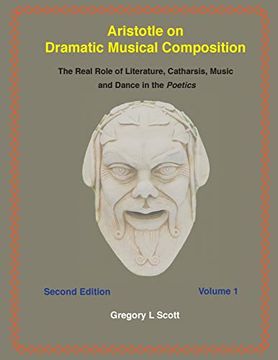Aristotle on Dramatic Musical Composition: The Real Role of Literature, Catharsis, Music and Dance in the Poetics (Volume 1) (en Inglés)
Reseña del libro "Aristotle on Dramatic Musical Composition: The Real Role of Literature, Catharsis, Music and Dance in the Poetics (Volume 1) (en Inglés)"
This book revolutionizes the 1000-year old tradition that stems from the first commentaries on the Poetics by the Arabic scholars. Aristotle’s treatise has always been thought to be about poetic-literary theory, with tragedy being its paradigm. Scott demonstrates, however, that Aristotle (c. 384-322 BCE) employs poiesis not in the way universally assumed until now, as “language in verse” or “poetry,” which the sophist Gorgias only coined in 415 BCE. Rather, Aristotle follows Diotima, who in the Symposium of Plato (c. 424-347) explains poiesis as mousike kai metra (typically “‘music’ and verses”). One reason Aristotle employs the Diotiman and not the Gorgian sense of poiesis is that not one poem exists in the so-called “Poetics”; another reason is that the definition of tragedy includes “music.” Scott subsequently demonstrates that Aristotle considers tragedy not to be a species of literature but one of dramatic musical theater that also requires dance and spectacle. Chapter 2 includes a revised version of Scott’s “The Poetics of Performance: The Necessity of Performance, Spectacle, Music, and Dance in Aristotelian Tragedy” (Cambridge University Press, 1999). The book also supplements his arguments of “Purging the Poetics” (Oxford Studies in Ancient Philosophy, 2003), reprinted here as Chapter 5, and provides the additional, and seemingly insuperable, reasons why Aristotle could not have written the clause with the words catharsis, pity, and fear in the definition of tragedy, as a number of internationally known ancient Greek specialists have already been accepting. As part of his reasons, Scott shows that, despite their very admirable paleography, Leonardo Tarán and Dmitri Gutas too often mangle the philosophical interpretations and even some of the philology regarding the “musical” terms, especially when they try to sweep the problems of catharsis under the rug. They claim in their recent Editio Maior (2012) that “The text of the passage [the word katharsis in Chapter 6] is not in dispute, though its interpretation is… The context and the agreement of B [one of the two extant Greek manuscripts] and SIGMA [the basis of the Syro-Arabic tradition] leave no doubt as to what Aristotle wrote.” However, many scholars dispute the text. Also, Tarán and Gutas never even recognize the Diotiman sense of poiesis that Aristotle uses, nor do they recognize the philosophical contradictions with keeping the katharsis-clause. They also downplay the relevance of A, the least corrupted Greek manuscript. All of this allows a fresh and better reading of the treatise that even with its fundamental misinterpretations has been the foundation of Western literary, dramatic and artistic theory. Contents Volume 1 includes: Plato’s meanings of poiesis as “music-dance and verse” and his use of rhuthmos often not as “rhythm” but “dance”; the importance of dance in the state for Plato; Aristotle’s agreement with his mentor on the meaning of the musical terms and the requirement of dance not only in the Poetics but in the Politics, along with the proof that Aristotle considers tragedy to be a species of dramatic "musical" art, not literature. Volume 2 is available at: https://www.amazon.com/dp/099970494X It includes the issues of catharsis, pity, and fear, and a complete rebuttal of the only attempted rigorous reply (by Stephen Halliwell in Between Ecstasy and Truth, 2011) to “Purging the Poetics.” This volume also contains: Aristotle's response to Plato without catharsis; comedy; whether or not the principles of "musical" dramatic theater can be applied to art forms like literature and cinema; history of the Poetics with regards to the two fundamental misconceptions; Bibliography; and Index for both volumes. List: $39. 300 pages.

